Canada election: Is Justin Trudeau in trouble?
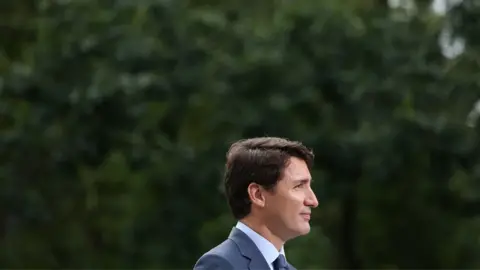 AFP/Getty Images
AFP/Getty ImagesFour years ago, Justin Trudeau swept to power in a historic, come-from-behind victory, promising "real change". Can the Liberal Party leader convince Canadians to rally behind him and his party once again?
The day Mr Trudeau was sworn in, he made headlines around the world as much for his new gender-balanced cabinet as for the way he explained why parity was a priority.
"Because it's 2015," the freshly minted prime minister said with a slight smile and a shrug that suggested he knew those three words were going to generate glowing reviews around the globe.
It was the beginning of the Trudeau honeymoon.
The prime minister was soon taking selfies with Barack Obama and being featured in a Vogue magazine spread that dubbed him the "New Young Face of Canadian Politics".
Later, after Donald Trump was elected south of the border, a Rolling Stone cover profile wondered whether Mr Trudeau was the "free world's best hope" - an internationalist counterpoint to the new American president, a strong voice for action on climate change, a progressive on social issues, pro-immigration.
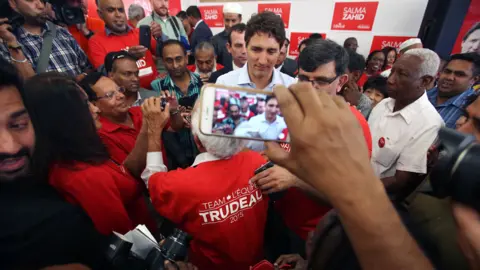 Getty Images
Getty ImagesBut it's 2019 - and voters don't view the Trudeau Liberals the same way as they did four years ago.
Then, the country had been governed for nearly a decade by Conservative Stephen Harper and voters had grown restive.
"There was a really strong sentiment for change, to get rid of Harper, get rid of the Conservatives, and move forward," says Western University political scientist Laura Stephenson.
Mr Trudeau's first federal campaign was one of bold promises - to legalise recreational cannabis, to bring in 25,000 Syrian refugees within weeks of taking office, to overhaul Canada's electoral system.
Voters responded to his positive campaign and vision of Canada that was in sharp contrast to Mr Harper's.
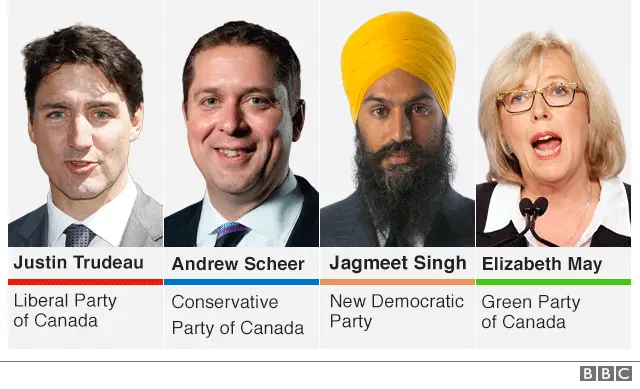
This week, as Mr Trudeau addressed Canadians after officially launching this federal campaign, he harkened back to that victory night - and warned of a return to "the Harper years" and what he deemed "a decade of failed Conservative policy".
"Canadians chose a new team, ready to invest in people and their communities, a team that understood that even if we live in the best country in the world, it's always possible to do better," he said.
"And even though we have a huge amount of work still to do, we spent the last four years making things better, and we have the record to prove it."
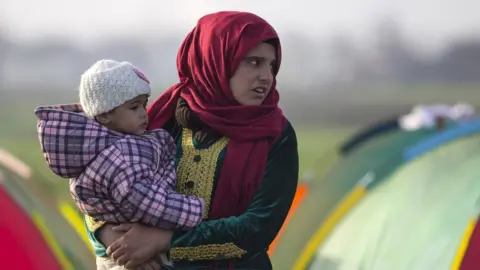 Getty Images
Getty ImagesHe does have a record to run on, and despite Mr Trudeau touting his government's accomplishments, it's mixed, notes Ms Stephenson.
The SNC-Lavalin affair - an ethics scandal early this year - took a toll on his support.
Last month an ethics watchdog found he had violated federal conflict of interest rules by improperly trying to influence a former minister in relation to a criminal trial facing major Canadian engineering firm SNC-Lavalin.
In August, Angus Reid Institute tracking indicated that about 30% of Canadians approve of the job he's done - and about 60% disapprove.
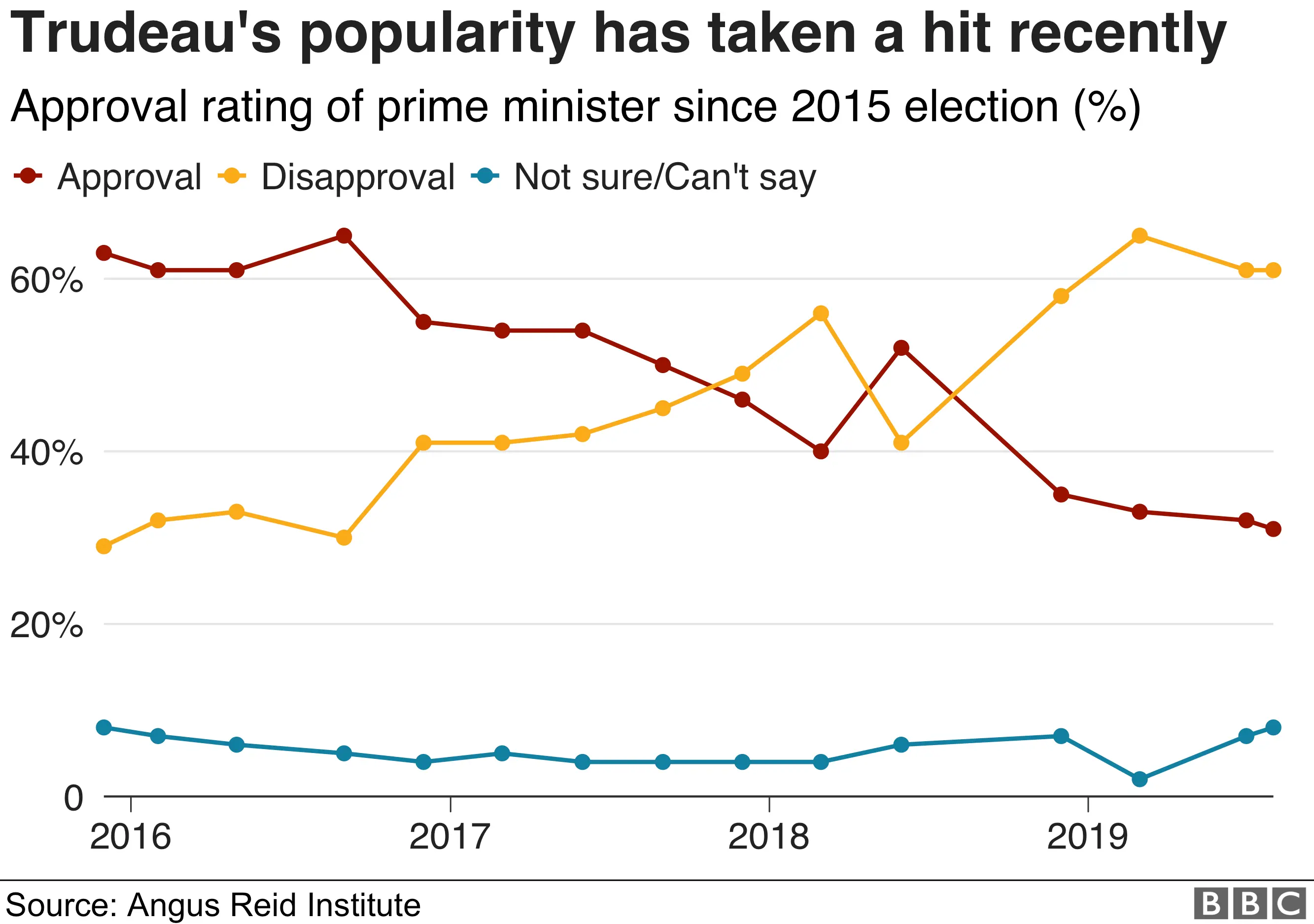
Liberal approval cratered during the height of the affair last spring, though the party has managed to claw back some support and are now running neck-and-neck with the Conservatives in national polls, suggesting for the moment a two-way race.
He will also have to defend decisions that have angered his progressive base.
Environmentalists disapprove of his support for the Trans Mountain oil pipeline expansion project and his purchase pipeline infrastructure to ensure it goes ahead. Canada is also not on track to meet its Paris Agreement greenhouse gas reduction target of 30% below 2005 levels by 2030.
A promise on electoral reform was quickly dropped, angering some left-leaning voters excited by the prospect of seeing an alternative voting system like proportional representation replace Canada's "First Past the Post" system, where a candidate with the most votes in a riding wins a seat in the House of Commons.
He has faced criticism for not cancelling a controversial arms deal with Saudi Arabia.
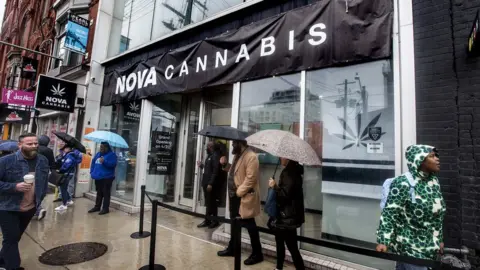 Toronto Star via Getty Images
Toronto Star via Getty ImagesOpponent Jagmeet Singh, leader of the left-wing NDP, has been accusing Mr Trudeau of "pretty words and empty promises".
But former interim Liberal leader Bob Rae says Mr Trudeau has been "consistently progressive" in the way he has branded himself and Canada.
"He has created a sense of who he is and a sense of what the country's all about that is in some contrast to the other parties. And frankly to other political leaders around the world," he says.
No longer new kid on the block
His government followed through on a number of major commitments - cannabis is legal, Canada's human rights act now protects gender identity against discrimination, and he has focused efforts on gender equality.
On the economic front, Canada renegotiated the North American Free Trade Agreement with Mexico and the United States, despite protectionism and what Mr Trudeau likes to call "unpredictability" south of the border. Unemployment is at near historic lows.
The question is whether Mr Trudeau, who needs the support of centre-left and left voters, can recapture the excitement that drove progressives to rally around him and his Liberal candidates four years ago.
"Now he's not the new face," says Ms Stephenson. "How's that going to play?"
Mr Trudeau has been taking every opportunity to draw a clear comparison between his Liberals and the Conservatives, seeking to convince voters eyeing alternatives like the NDP, the Green Party - or the Bloc Quebecois in Quebec - to unite around the Liberal banner, and for Liberal voters to show up to vote.
If the progressive vote fractures, it could play in the Conservatives' favour.
The Liberal team has been aggressive in pushing out potentially embarrassing information about Conservative candidates, putting Conservative leader Andrew Scheer on the defensive early in the campaign.
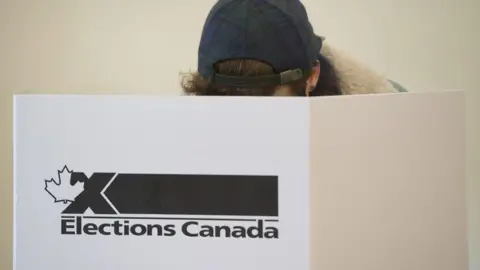 Canadian Press
Canadian Press"The job of any Liberal leader is to persuade people that if the vote is divided too much that the net result of that will be a victory for the Conservatives," says Mr Rae.
With five weeks to go before Canadians vote on 21 October, it's proving to be a toughly fought campaign - but Mr Trudeau has some advantages.
Despite a national dead heat with the Conservatives, polls indicate that the incumbent Liberals have leads in vote-rich regions like Quebec and Ontario, two provinces that, collectively, account for 199 of the 338 seats in the House of Commons.
Canadians rarely remove a majority government from power after a single term.
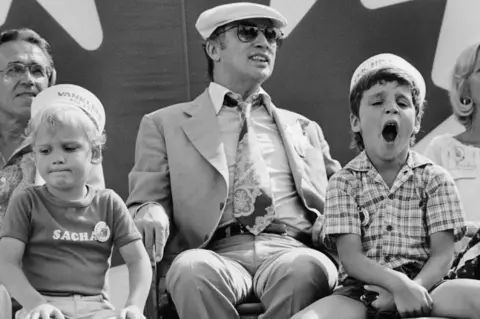 Getty Images
Getty ImagesCampaigns also matter - and Mr Rae says Mr Trudeau "has tremendous instinct for political campaigning" - comfortable with the performative element and a tough political fighter.
"I think people who underestimate the importance of the campaign are making a big mistake."
Unexpected events can also blindside campaigns, test the mettle of leaders, and have an impact on the eventual outcome.
"There are issues that can emerge that become focal points, and I think that sometimes how the parties are tested are the most important thing of all," says Ms Stephenson.
